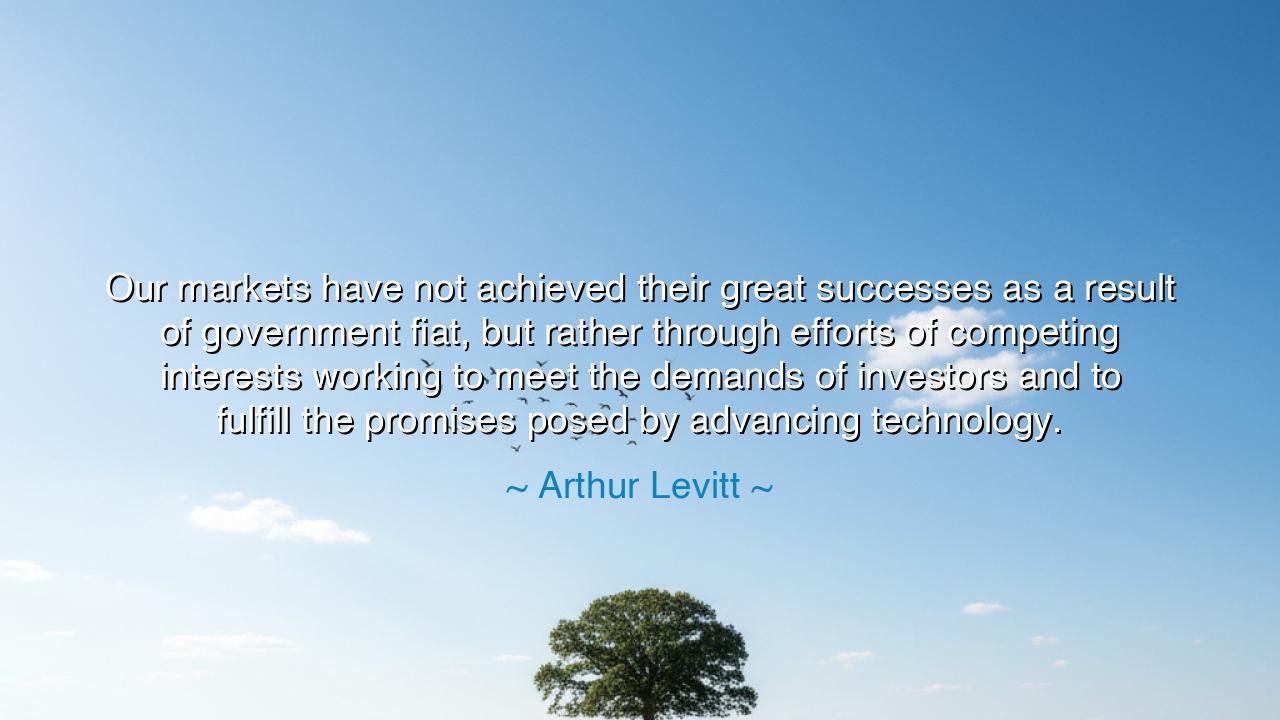
Our markets have not achieved their great successes as a result
Our markets have not achieved their great successes as a result of government fiat, but rather through efforts of competing interests working to meet the demands of investors and to fulfill the promises posed by advancing technology.






Hear the words of Arthur Levitt, spoken with the voice of one who has witnessed the engines of commerce and the rise of modern wealth: “Our markets have not achieved their great successes as a result of government fiat, but rather through efforts of competing interests working to meet the demands of investors and to fulfill the promises posed by advancing technology.” This is no light statement, but a reminder carved out of centuries of trade and toil, that prosperity is not bestowed by decree, but born of struggle, vision, and innovation.
When Levitt speaks of markets, he points not only to numbers flashing on screens or the silent exchange of stocks, but to the ancient spirit of commerce itself—the meeting place of human desire and human ingenuity. Since the dawn of civilization, from bazaars under the desert sun to ships laden with spice and silk, men have gathered to trade, to risk, and to dream of profit. Such prosperity has never been sustained by the will of rulers alone, but by the ceaseless dance of competing interests, each striving to offer better, faster, cheaper, or more wondrous goods to those who demand them.
The mention of government fiat reminds us of the ages when kings and emperors sought to dictate the flow of wealth. History shows that when rulers sought to command markets by decree, stagnation often followed. Recall the Roman Empire, when Diocletian sought to fix prices by law, decreeing limits upon wages and goods. The result was not stability, but scarcity and unrest. For markets thrive not by coercion, but by freedom, by the countless calculations of buyers and sellers, each acting out of their own interest, yet together creating abundance none could achieve alone.
But Levitt also reminds us of the role of technology—that restless flame which ignites new possibilities. The Industrial Revolution is a shining example: it was not decrees of governments that filled factories with machinery, nor edicts that brought railroads across continents. It was inventors, entrepreneurs, and daring investors who saw in the steam engine, the telegraph, and later electricity, the promise of transforming society. The markets rewarded their risks, and from this came a flood of goods, services, and opportunities that changed the face of the earth.
One might recall the story of Thomas Edison, who sought to harness the power of light. Governments did not decree the spread of electric lamps into every home; rather, investors risked capital, competing interests developed bulbs, wires, and power grids, and the people themselves demanded the illumination of their nights. Thus, from vision and struggle—not command—emerged a revolution that lengthened the hours of human life and industry. The same is true today, where advancing technology fuels markets in ways no government could have scripted.
The deeper lesson here is one of humility and faith: humility for leaders, who must remember that they cannot decree prosperity into being, and faith in the creative spirit of men and women, who when free to compete and innovate, can lift entire nations. This does not mean that governance has no place, for laws must ensure fairness and prevent corruption, but it does mean that true progress cannot be commanded—it must be earned through effort, risk, and ingenuity.
For us, the teaching is plain: do not wait for others to decree your success, nor depend solely on institutions to carve your path. Instead, cultivate your own vision, embrace the struggle of competition, and harness the tools of advancing technology to serve others. Just as markets thrive when many interests clash and refine one another, so too do individuals grow strong when they strive, adapt, and rise to meet challenges.
Thus the words of Arthur Levitt resound as both wisdom and challenge: the greatness of markets lies not in edicts, but in the restless striving of free men and women, guided by need, sharpened by rivalry, and empowered by technology. Let us honor this truth, and let each of us, in our own sphere, become a participant in this eternal struggle for progress. For it is in striving—not in fiat—that civilizations rise.






AAdministratorAdministrator
Welcome, honored guests. Please leave a comment, we will respond soon